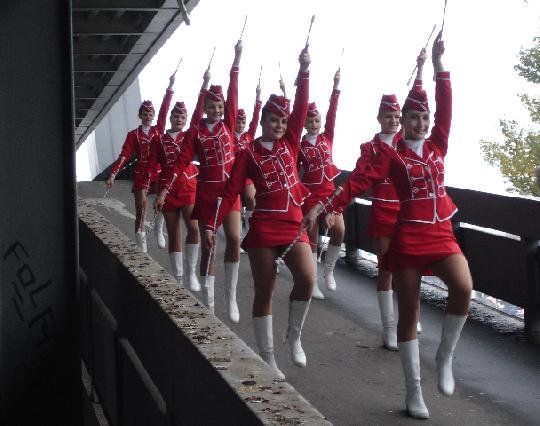Anetta Mona Chisa and Lucia Tkacova
dal 11/12/2008 al 14/2/2009
Segnalato da
11/12/2008
Anetta Mona Chisa and Lucia Tkacova
NBK Neuer Berliner Kunstverein, Berlin
The artists have been working together since 2000, while at the same time pursuing individual careers. In their shared work, they explore gender relations as well as the role of eastern European artists in a western-dominated art world. With videos, installations, textual work, and performances, they refract consumer expectations and trigger processes of reflection about the art market, and making art. The exhibition and publication are conceived as an overview of their work. Curated by Marius Babias.

Curated by Marius Babias
Anetta Mona Chişa (Prague) and Lucia Tkáčová (Bratislava) have been working together since 2000, while at the same time pursuing individual careers. In their shared work, they explore gender relations as well as the role of eastern European artists in a western-dominated art world. With videos, installations, textual work, and performances, they refract consumer expectations and trigger processes of reflection about gender questions, the art market, and making art. The exhibition and publication are conceived as an overview of their work. The following publication is their first comprehensive monograph.
The post-communist world with its numerous refractions and discontinuities marks out the thematic framework of their work. The gaze of the artist is thus directed less at the repressed past and the devastations of eastern European biographies as at the concrete experiential world of individuals being subjected to the so-called process of transformation to capitalism. They ask what experiential spaces remain in the current state of affairs.
Chişa's and Tkáčová's work has not been the expression of a search for identity, as can often be seen in the work of artists of the older generation of eastern Europeans; instead, their artistic interest lies in making transformation visible and the new formation of the New Europe. The relationship of artists to their past is an ironic one, as in their engagement with Karl Marx, the Ur-father of communism (Capital: Magical Recipes for Love, Happiness and Health, Video, 2006; All Periods in Capital, object, 2008).
The preferred medium of the two artists is video, because it can quickly be used in a DIY technique and because, at least in Eastern Europe, it usually was appropriated by male artists. A twofold self-empowerment: the artists take the freedom to transgress the past as well as to choose an artistic medium that they in a sense tear from the male domain. Without explicitly picking up on feminist positions in the historical neo-avant-garde, a few of their works are founded in gender politics, especially their video series Dialectics of Subjection, where the powerful on the stage of world politics and the art world are brutally exposed from the perspective of the woman and artist. In the video Manifesto of Futurist Women (Let's Conclude), 2008, Chişa and Tkáčová refer to the the "Manifesto of Futurist Women" by Valentine de Saint-Point, 1912.
Self-empowerment in their own Eastern European context is opposed by exclusion in the Western European context. Then as now, background and gender still control artistic success on the art market. The project Private Collection came from this experience; in this project, which has been realized since 2005 in the art centers of Paris, Berlin, London, Vienna, New York, and Zurich, the artists steal objects from galleries around the world, and then exhibit them. The fetish of art, the ultimate sales secret on the art market thus undergoes devaluation to the level of an exchangeable and banal everyday object. The stolen objects, archived like jewels in the exhibition, tell of the mechanisms of inclusion and exclusion of a stylistically lost art world that consists of symbolic charges, speculative claims, and ultimately banal objects of exchange.
Image: Videostill, Manifesto of Futurist Women (Let’s Conclude), 2008
Opening: Friday, December 12, 7 pm
With Performance: "Uncomfortable Heritage"
Neuer Berliner Kunstverein n.b.k.
Chausseestraße 128-129 // 10115 Berlin // Germany
Opening hours Exhibition
Tuesday-Sunday, 12-6pm
Thursday, 12-8pm
Opening hours Video-Forum/Artothek
Tuesday/Thursday, 2-8pm
Wednesday/Friday, 2-6pm
(The exhibition and the collections will be closed from December 23, 2008 to January 5, 2009.)



